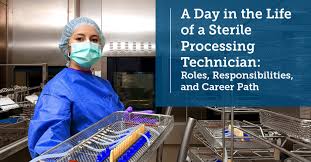
What Is a Sterile Processing Tech and Why Should You Care
Sterile processing tech is the real name for the people who clean, check, and pack every single tool that doctors and nurses use on patients. Imagine a surgeon opening a shiny metal tray full of scissors, clamps, and needles. Those tools look perfect because a sterile processing tech spent hours making sure not one tiny germ is left on them. Without sterile processing tech workers, hospitals would have to close operating rooms because dirty tools can give patients dangerous infections that sometimes make them very sick or even cause death. These workers are like invisible guardians who stop millions of infections every year, yet most people walk past them in the hallway and have no idea how important they are.
Every day, trucks bring big blue boxes full of used tools from operating rooms to the sterile processing department. The sterile processing tech puts on special gloves, goggles, and a gown, then starts the big cleaning adventure. First, they wash everything by hand in special sinks with strong soap that kills germs. Next, they put the tools into giant washing machines that are hotter and stronger than your dishwasher at home. After that, the sterile processing tech sits at a big table with bright lights and checks every single tool with a magnifying glass to look for tiny spots of blood or broken parts. If even one little thing is wrong, they throw that tool away or send it to be fixed. Only when everything looks perfect do they carefully pack the tools into special paper or plastic pouches and put them into huge metal ovens called autoclaves that cook them with super-hot steam to kill every last germ. When the cycle finishes, the sterile processing tech writes down everything in a computer so the hospital knows those tools are safe to use again.
A Normal Day as a Sterile Processing Tech (You Won’t Believe How Cool It Is)
Picture this: you walk into the hospital wearing cute scrubs and comfy shoes. You say good morning to your team, then go to the dirty room where carts full of used tools wait for you. You turn on happy music (many departments let you play your own playlist) and start sorting everything. Big bowls go in one basket, tiny eye surgery tools go in another. You spray everything with foam that eats blood and tissue away. Ten minutes later, you load the washer and press start. While the machines do the hard work, you drink coffee and talk with your friends about weekend plans.
When the washer beeps, you move everything to the clean side (you are never allowed to bring dirty things to the clean side – that is a big rule). Now the fun part starts! You sit under super bright lights and inspect every tool like a detective looking for clues. You use a tiny brush to clean holes that are smaller than a pencil lead. If something is sticky or looks funny, you clean it again until it shines like new. Many sterile processing tech workers say this part feels like a game – can you make every tool perfect before lunch?
How to Become a Sterile Processing Tech Super Fast
Good news – you do not need college! Most sterile processing tech jobs only ask for a high school diploma or GED. Many community colleges and vocational schools have programs that last 3-12 months. Some hospitals even pay you while you train on the job. You learn things like how germs die, how to read instrument cards, and how to stay safe around blood. After the class, you can take a big test to become certified (most bosses love when you have the letters CRCST after your name). Certification costs a few hundred dollars but helps you earn thousands more every year.
How Much Money Does a Sterile Processing Tech Make?
New sterile processing tech workers start around $17–$22 per hour in most places. With experience and certification, many make $25–$35 per hour. Night shift and weekend shift pay extra money. Some sterile processing tech workers who become supervisors or teachers make over $80,000 a year. Hospitals also give free health insurance, paid vacation days, and sometimes help pay for more school if you want to become a surgical tech or nurse later.
Is Sterile Processing Tech Hard or Boring
Some days are busy and exciting, some days are calm and relaxing. You stand and walk a lot, so good shoes are important. You have to like cleaning and following rules exactly. But most sterile processing tech workers say they never get bored because every day brings new tools and new stories from the operating room. Plus, your team becomes like family because you celebrate birthdays and share snacks together.
Conclusion
More people are having surgery every year, and new rules say every tool has to be cleaner than ever before. Many older workers are retiring, so hospitals are looking for fresh faces who want a stable job that pays well and makes a difference. Some places will even hire you and train you for free if you promise to stay a year or two.
FAQs
Q: Do I need to be good at science to be a sterile processing tech?
A: You just need basic high school science. Everything else you learn in the short training program.
Q: Can I work part-time as a sterile processing tech?
A: Yes! Many hospitals love part-time and weekend workers.
Q: Is the job scary because of blood?
A: At first maybe, but you wear gloves and everything goes straight into washers. Most people get used to it in a week or two.

